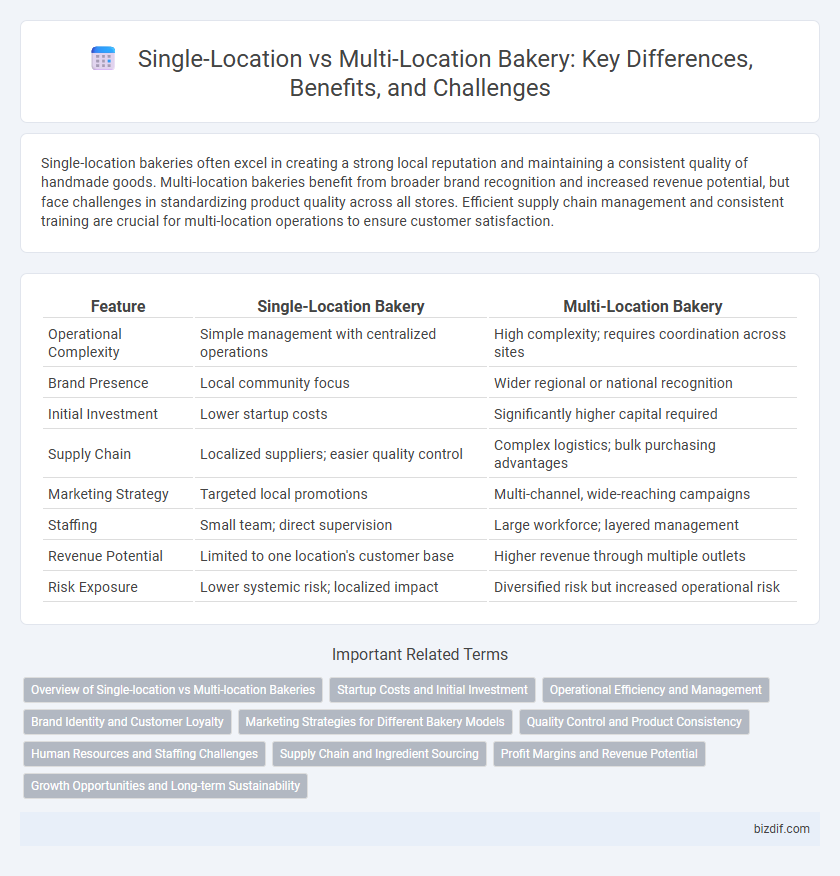Single-location bakeries often excel in creating a strong local reputation and maintaining a consistent quality of handmade goods. Multi-location bakeries benefit from broader brand recognition and increased revenue potential, but face challenges in standardizing product quality across all stores. Efficient supply chain management and consistent training are crucial for multi-location operations to ensure customer satisfaction.
Table of Comparison
| Feature | Single-Location Bakery | Multi-Location Bakery |
|---|---|---|
| Operational Complexity | Simple management with centralized operations | High complexity; requires coordination across sites |
| Brand Presence | Local community focus | Wider regional or national recognition |
| Initial Investment | Lower startup costs | Significantly higher capital required |
| Supply Chain | Localized suppliers; easier quality control | Complex logistics; bulk purchasing advantages |
| Marketing Strategy | Targeted local promotions | Multi-channel, wide-reaching campaigns |
| Staffing | Small team; direct supervision | Large workforce; layered management |
| Revenue Potential | Limited to one location's customer base | Higher revenue through multiple outlets |
| Risk Exposure | Lower systemic risk; localized impact | Diversified risk but increased operational risk |
Overview of Single-location vs Multi-location Bakeries
Single-location bakeries offer a unique, community-focused experience with specialized products and personalized customer service, often excelling in artisan quality and local brand loyalty. Multi-location bakeries benefit from economies of scale, broader market reach, and consistent product standards across various regions, which enhance operational efficiency and brand recognition. Decision-making between the two depends on goals related to growth potential, resource allocation, and customer engagement strategies.
Startup Costs and Initial Investment
Startup costs for a single-location bakery typically include rent, equipment, and initial inventory, often ranging from $50,000 to $150,000 depending on size and location. Multi-location bakeries require significantly higher initial investments, averaging $200,000 to over $500,000 per site due to duplicate expenses in leasing, staffing, and supply chain setup. Budgeting for multi-location expansion also demands investment in scalable production systems and centralized management technology to ensure operational efficiency.
Operational Efficiency and Management
Single-location bakeries benefit from streamlined operations and direct oversight, enabling rapid decision-making and consistent product quality. Multi-location bakeries face complex challenges in maintaining operational efficiency due to the need for standardized processes and centralized management systems across multiple sites. Implementing advanced inventory tracking and employee scheduling technology helps multi-location bakeries optimize resource allocation and reduce operational costs.
Brand Identity and Customer Loyalty
Single-location bakeries often cultivate a strong, authentic brand identity through personalized customer experiences and unique local recipes that resonate deeply with the community. Multi-location bakeries leverage consistent branding and standardized products to build widespread customer loyalty but may sacrifice the intimate connection fostered by a single-location presence. Balancing consistency and local flavor is crucial for scaling brand identity while maintaining customer loyalty across multiple outlets.
Marketing Strategies for Different Bakery Models
Single-location bakeries benefit from hyper-local marketing strategies such as community engagement, local SEO, and in-store promotions to build a loyal customer base. Multi-location bakeries require scalable campaigns leveraging regional advertising, social media consistency, and loyalty programs that adapt across markets. Data-driven insights and targeted digital ads optimize reach for both models, ensuring effective customer acquisition and retention.
Quality Control and Product Consistency
Single-location bakeries maintain tighter quality control due to centralized oversight, ensuring consistent product taste, texture, and freshness. Multi-location bakeries face challenges in standardizing recipes and baking processes across sites, which can lead to variability without rigorous training and robust quality assurance systems. Implementing standardized protocols and frequent audits is essential for multi-location bakeries to achieve uniform product consistency and customer satisfaction.
Human Resources and Staffing Challenges
Single-location bakeries face simpler human resources management but often struggle with maintaining a consistent skill set during peak demand. Multi-location bakeries require robust staffing strategies, including standardized training programs and regional HR coordination to ensure uniform quality and operational efficiency. Recruiting and retaining specialized bakers and managers across multiple sites intensifies challenges related to employee engagement, scheduling, and compliance with varying labor laws.
Supply Chain and Ingredient Sourcing
Single-location bakeries often benefit from streamlined ingredient sourcing, enabling direct relationships with local suppliers that ensure freshness and reduce transportation costs. Multi-location bakeries require a more complex supply chain management system to maintain consistency in quality and pricing across all sites, often relying on centralized distribution centers and bulk purchasing agreements. Efficient coordination in multi-location operations enhances inventory control and reduces the risk of ingredient shortages, which is critical for meeting customer demand consistently.
Profit Margins and Revenue Potential
Single-location bakeries often benefit from lower operating costs and focused management, resulting in higher profit margins per store. Multi-location bakeries leverage economies of scale and brand recognition to generate significantly higher overall revenue but may face increased overhead and managerial complexity that can compress individual store margins. Optimizing supply chains and standardized processes helps multi-location bakeries enhance profit margins while capitalizing on expanded market reach.
Growth Opportunities and Long-term Sustainability
Multi-location bakeries benefit from expanded brand recognition and diversified revenue streams, enabling greater scalability and resilience in fluctuating market conditions. Single-location bakeries often face limitations in market reach and growth potential but can maintain higher control over product quality and customer experience. Long-term sustainability in multi-location bakeries is driven by operational efficiencies and economies of scale, while single-location bakeries rely on community loyalty and specialized craftsmanship.
Single-location bakery vs Multi-location bakery Infographic

 bizdif.com
bizdif.com